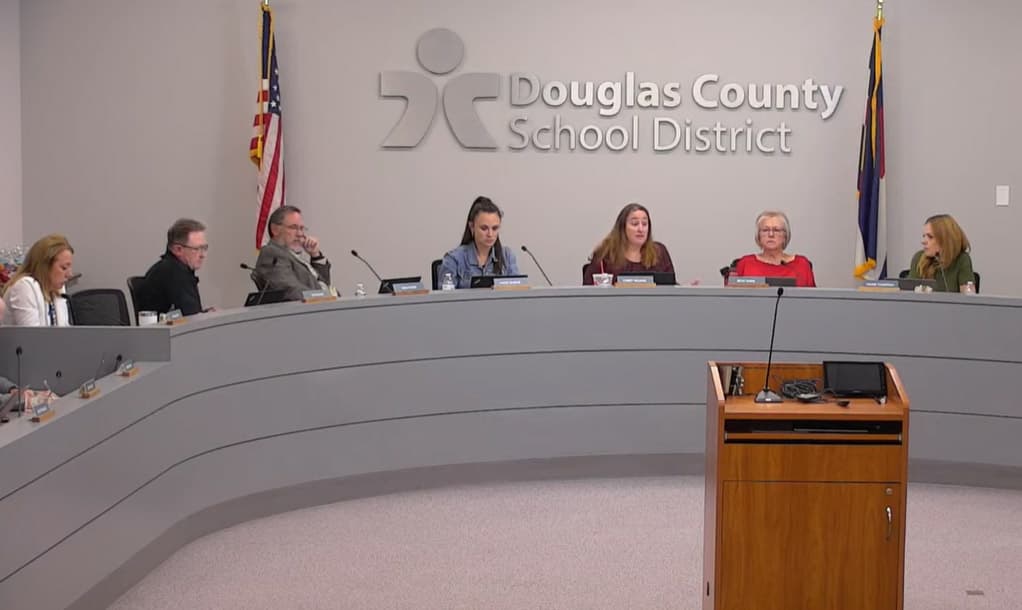
In a snap decision, the board of Colorado’s third largest school district voted Tuesday night to require parental permission before middle and high school students participate in the state’s largest youth health survey instead of the current opt-out policy.
The move is a significant shift in how the Douglas County School District collects health data: prioritizing explicit parental consent over anonymous, voluntary data collection used to better understand youth health and what factors support youth to make healthy choices.
“Our schools, they exist to serve our families and not to replace them,” said board member Becky Meyers.
No written copy of the motion to change permission was provided for the public. Typically when adopting or changing a policy, board members are given a draft of the policy attached to the agenda so directors and the public know what is being proposed. Some board members didn’t know until well into the discussion what change they were voting on.
A handful of people testified, none of them students.
Beginning this year, the change in policy would make parents actively choose for their children to take, or “opt-in” instead of “opt-out” of, the Healthy Kids Colorado Survey, Colorado’s comprehensive, confidential, online survey on the health and well-being of young people administered every two years.
Topics include physical activity, mental health, tobacco and substance use, and school safety and bullying. The high school survey includes demographic questions about sexual orientation, sexual health and sexual violence questions. Health authorities, nonprofits and law enforcement use the survey to know where to target resources to help youth. Statewide, 120,000 youth participated in the survey in 2023, including 7,900 students in Douglas County.
Contentious debate
In a 4 to 2 vote following an at times contentious debate, the board majority said the move empowers parents, while opponents said it will cripple a valuable information collection tool.
Currently in Douglas County, parents can opt their children out of the survey. Youth can also decide they don’t want to take it as well or skip a question. But proponents of the switch said parents are uncomfortable with some of the “sensitive” information on the survey.
“They think because it says ‘healthy kids’ that we're going to be asking about diet and exercise and not necessarily about sexuality and firearms,” said board president Christy Williams, board president. “When they find those things out (they) are super disappointed that they didn't opt their kid out.”
But opponents to the change were most concerned about the loss of valuable data. Studies show participation rates plummet when surveys are “opt-in.” For that reason, Jefferson County Public Schools in 2019 switched from an opt-in to an opt-out in order to increase participation given the rise in youth mental health issues. Colorado Springs D11 switched from opt-out to opt-in in 2023, and participation declined so much that its results aren’t listed on the statewide survey results.
One in five Black students report being bullied in DougCo
Board member Brad Geiger pointed out that the survey reveals that "our Black kids are bullied more, that our trans kids are bullied more, that our gay kids are bullied more."
One in five Black students is bullied in the district, one-third of all gay students. The survey gives granular detail such as nearly 60 percent of Black students were bullied in a locker room or bathroom, and 66 percent in the cafeteria.
A quarter of girls who dated or went out with someone reported they’d been controlled or emotionally hurt when they were dating. Forty-three percent of females texted or used their phone while driving.
Geiger also noted that the report cites that in the survey at least 10 percent of girls statewide reported that they had been involved in non-consensual sexual contact.
“I think knowing that's important,” he said. “A district can choose to help address that issue, say it’s not the district’s problem or “one we're deciding today is that it is not information we even want to hear about.”
Geiger was frustrated that the idea was “sprung on the public” on Friday with the vote on Tuesday, leaving little time for the public to weigh in. Board member Tim Moore, a former sheriff’s deputy, said the survey data is invaluable for law enforcement to understand trends and target drug and alcohol education at the appropriate grade in school — but he said parental choice had to come first.
“As much as I do feel concerned that it'll cause a loss of data and I don't want that, my principle that I stand on is that the parent's choice is more important.”
Board member Valerie Thompson noted that nearly one-third of Colorado’s youth say they could access a loaded firearm without adult permission.
“That is a terrifying statistic that we wouldn't have without this survey and it helps inform practice and security at our schools to know that information.”
Thompson offered a motion to postpone the vote to give the public more time to weigh in as well as give district staff to report on what it would require to change the procedure to opt-in.
“I think that to make a decision when we know the implications are so great, we should follow our typical process which is to introduce the topic, have a conversation, allow opportunity to hear from our community, hear from our families, hear from our students, and then move forward with a decision.”
Her motion failed.
District staff must now develop a new opt-in system for the survey this school year. President Williams said she hopes the district can develop its own replacement health survey.









